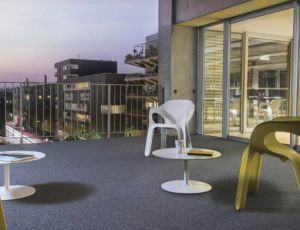Carpets for commercial facilities
Wykładziny obiektowe są kluczowym elementem wyposażenia wnętrz w różnych typach obiektów komercyjnych, przemysłowych i użyteczności publicznej. Ich wybór jest istotny zarówno z perspektywy estetycznej, jak i funkcjonalnej. Wykładziny obiektowe muszą być nie tylko estetyczne, ale również trwałe, odporne na intensywne użytkowanie i łatwe w utrzymaniu. W zależności od potrzeb, mogą to być wykładziny dywanowe, winylowe lub przemysłowe, które różnią się pod względem materiału, właściwości i przeznaczenia.
Types of Commercial Flooring: Overview and Comparison
Choosing the right flooring for commercial spaces is a key element affecting aesthetics, functionality, and durability of the interior. Among the available contract floor coverings on the market, we can distinguish several main types, frequently used in stores, shopping centers, and other commercial properties.
Carpet flooring:
These are popular for their softness and comfort. They can aid in noise dampening, which is particularly useful in large, noisy spaces. However, they require regular cleaning and may not be suitable for places with high foot traffic.
Vinyl (PVC) flooring - heterogeneous:
Heterogeneous flooring consists of multiple layers, providing exceptional durability and wear resistance. They're easy to clean and available in a wide range of designs, making them an ideal choice for commercial properties.
Vinyl (PVC) flooring - homogeneous:
Homogeneous flooring is made of a single type of material throughout, offering a uniform look and high resistance to wear. They are also easy to clean and maintain, making them a practical choice for commercial properties.
Industrial flooring:
These are designed for strength and durability in the most demanding environments. Industrial flooring is often used in warehouses, workshops, and other places where durability is crucial.
Choosing the right type of contract flooring depends on many factors such as foot traffic, type of activity, budget, and also aesthetic preferences. Remember that the appropriate flooring can greatly enhance the look and functionality of your commercial property.
Choosing the Right Flooring for Your Store
The choice of the right flooring for a store can significantly influence its appearance, customer comfort, and durability. There are many different types of flooring available on the market, but not all are suitable for every store. Here are a few key factors to consider when choosing flooring for a store.
Durability: Stores often have heavy foot traffic, meaning that flooring must be wear-resistant. Vinyl flooring, both heterogeneous and homogeneous, are known for their durability and can be a good choice for stores with heavy foot traffic.
Ease of cleaning: Stores are places where it's easy for dirt to accumulate, so it's important that the flooring is easy to clean. Vinyl floors are easy to keep clean, making them a practical choice.
Aesthetics: The appearance of the flooring can affect the atmosphere of the store and customers' experiences. Carpet flooring can add warmth and comfort, while vinyl flooring offers a wide range of patterns and colors that can be adapted to the store's style.
Safety: Flooring should be slip-resistant to ensure the safety of customers and staff. Vinyl and industrial flooring are often chosen for their slip-resistant properties.
Cost: Budget is always an important factor to consider. Vinyl flooring is often more economical than some other types of flooring, but it's also worth considering the costs of installation and maintenance.
Materials Used in Different Types of Flooring
PVC Flooring: PVC flooring, also known as vinyl flooring, is made from polyvinyl chloride (PVC). It consists of several layers, including a PVC plastic layer, a pattern layer, and a protective layer. PVC floors are durable, easy to clean, and available in a wide range of patterns and colors.
Roll Carpet Flooring: Roll carpet flooring is typically made from synthetic fibers such as nylon, polyester, or polypropylene, though natural fibers like wool can also be used. These fibers are attached to a backing, which can be made from various materials, including latex, PVC, or fabric.
Tile Flooring: Tile flooring can be made from various materials, depending on the type of tile. Carpet tiles are typically made from synthetic fibers attached to a backing, similar to roll carpet flooring. Vinyl tiles are made from PVC, like PVC flooring.
Vinyl Panels: Vinyl panels are similar to PVC flooring, but are usually thicker and have a harder structure. They are made from several layers, including a PVC layer, a pattern layer, and a protective layer. Vinyl panels are durable, easy to clean, and available in a wide range of patterns and colors.
Remember, choosing the right flooring for your store is an investment that can impact customer experiences, the durability of your floor, and the overall look of your store. Therefore, it's worth spending time considering various options and selecting the best material for your store.
Durability and Longevity of Commercial Flooring
Durability and longevity are key factors to consider when choosing flooring for commercial spaces. Here are a few aspects to consider:
Wear Resistance: Commercial flooring, such as vinyl and industrial flooring, is designed to withstand heavy traffic. They are wear-resistant, which means they can withstand heavy traffic for a long time without visible signs of wear.
Stain and Dirt Resistance: Commercial flooring is often designed to be stain-resistant and easy to clean. This is crucial in commercial properties where dirt accumulation is common.
Weather Resistance: Some commercial floors are moisture-resistant, which is important in properties where there may be flooding or exposure to moisture, such as grocery stores.
Fire Resistance: Some commercial floors are fire-resistant, which can be important for the safety of the property.
Color Durability: Commercial flooring is often designed so that colors are durable and do not fade over time, even under intense light
Choosing durable and long-lasting flooring for a commercial property is an investment that can bring benefits in the long run. Remember that it's worth spending time considering various options and choosing a floor that best meets the needs of your property.
Aesthetics and Design of Commercial Flooring
The aesthetics and design of the flooring can have a significant impact on the atmosphere and overall appearance of a commercial property. Here are a few aspects to consider:
Colors and Patterns: Commercial flooring is available in a wide range of colors and patterns, allowing them to match the style and color scheme of the property. Choosing the right color and pattern can help create a desired atmosphere and influence customer experiences.
Texture: The texture of the flooring can affect user comfort and experiences. For example, a soft carpet floor can add warmth and comfort, while a smooth vinyl floor can give a sense of cleanliness and modernity.
Style: Flooring can help emphasize the style of the commercial property. For example, a minimalist, uniform floor can fit into a modern, minimalist interior, while a floor with a rich pattern may suit a more traditional, luxurious interior.
Quality: The appearance and quality of the flooring can affect customers' perceptions of the property. Choosing high-quality flooring can help create a positive impression and attract customers.
Remember that choosing flooring is not just a matter of practicality, but also aesthetics. Well-chosen flooring can significantly improve the look of a commercial property and attract more customers.
Cleaning and Maintenance of Commercial Flooring
Cleaning and maintenance are key aspects of keeping the flooring in good condition, especially in commercial properties where traffic is high. Here are some tips on how to care for commercial flooring:
Regular vacuuming: Regular vacuuming is key to keeping the floor clean. It helps remove dust, dirt, and allergens that may accumulate in the flooring.
Stain cleaning: In commercial properties, it's easy for liquids and other dirt to spill. It's important to quickly react to stains, using appropriate cleaning products.
Professional cleaning: Depending on the type of flooring and the intensity of traffic, regular professional cleaning may be necessary. This may include steam cleaning, shampooing, or other methods that will help restore the flooring to its original state.
Maintenance: Some types of flooring, like vinyl flooring, may require regular maintenance, such as polishing, to maintain their appearance and extend their lifespan.
Replacement: Despite regular cleaning and maintenance, there may come a time when the flooring will need to be replaced. Planning regular inspections and flooring replacement can help keep the property in good condition.
Proper cleaning and maintenance of the flooring can significantly extend its lifespan and improve the look of the commercial property.
Ecological Aspects of Commercial Flooring
In today's world, more and more companies are paying attention to sustainable solutions, and flooring choice is no exception. Here are a few ecological aspects to consider when choosing flooring for commercial properties:
Production: Some flooring is produced in a more eco-friendly way than others. For example, some vinyl flooring is produced from recycled PVC, reducing its environmental impact.
Durability: Flooring that is durable and long-lasting can be more eco-friendly, as they do not need to be replaced often. Vinyl and industrial flooring are known for their durability, which can contribute to reducing their environmental impact.
Recycling: Some flooring can be recycled at the end of its life, reducing the amount of waste going to the landfill. It's worth checking if the flooring you choose can be recycled.
Cleaning and maintenance: Some flooring requires less intensive cleaning and maintenance methods, which can reduce water and chemical usage.
Eco-certifications: Some flooring has eco-certifications that confirm their low impact on the environment. This can be an added bonus for companies who want to highlight their commitment to sustainable development.
.webp)
.jpg)



















.jpg)


































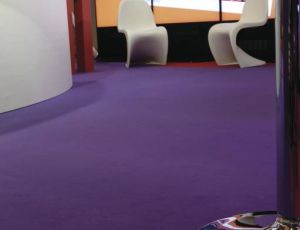











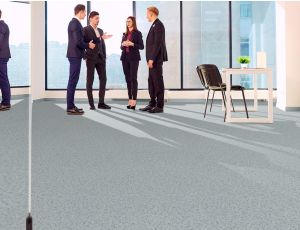










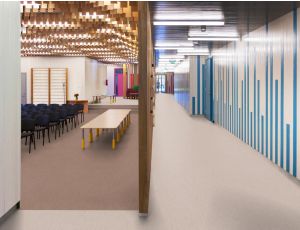































.jpg)






























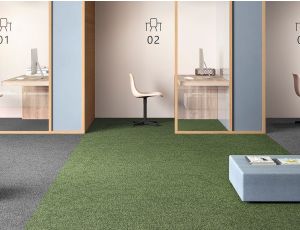












.jpg)




















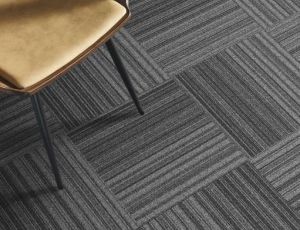















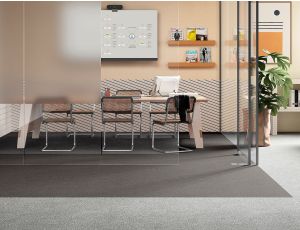














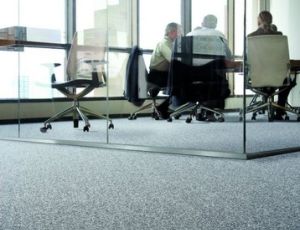




















.jpg)





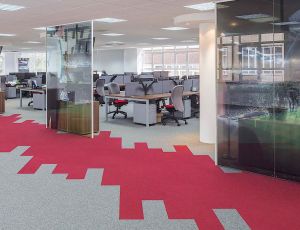
































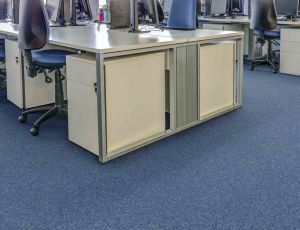













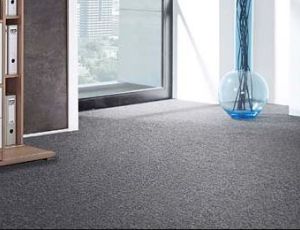





















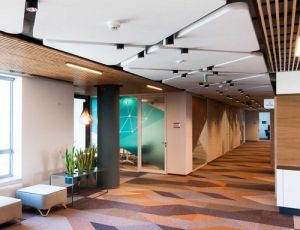









































.jpg)
.jpg)
.jpg)
.jpg)
.jpg)
.jpg)
.jpg)
.jpg)
.jpg)
.jpg)
.jpg)








.jpg)

